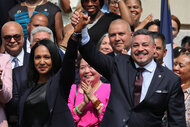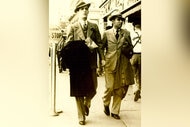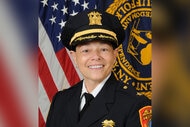Create a free profile to get unlimited access to exclusive videos, breaking news, sweepstakes, and more!
4 Questions For 4 Latina Criminal Justice Trailblazers: Judge Christine Arguello
In honor of Hispanic Heritage Month, Oxygen.com asked four trailblazing Latinas to talk about their professional experiences in our system of law and order.

Most of Judge Christine Arguello's adult life has been a series of "firsts": she was the first Latina from Colorado to be admitted into the Harvard University School of Law in 1977; the first Hispanic to be made partner at one of the "big four" law firms in Colorado; the first Latino to receive tenure at the University of Kansas School of Law; and, in 2000, the first Hispanic to serve as Chief Deputy Attorney General for Colorado. Then, in 2008, she became the first Latinx person ever appointed as a U.S. District Court Judge for the District of Colorado.
In an interview with Oxygen.com, she spoke about why she decided to go to law school and, eventually, become a judge, what representation can mean in a courtroom, how she sees the impact of her community's experiences with the law as then come through her courtroom and what she hopes people understand about being a judge.
Oxygen: What made you pursue the law as a career, and did you always want to be a judge?
Judge Arguello: I grew up in Buena Vista, Colorado. And my dream of becoming a lawyer — and it was a dream not only of becoming a lawyer but of going to Harvard Law School — came back when i was only 13 years old and in the seventh grade.
I happened to be an avid reader, and I was in the public library with a friend of mine when I picked up this news magazine. In it, was an article on lawyers and law schools.
I was fascinated; I said, "Wow, lawyers can really change the world. They can make societal changes, they can protect individual rights." But my parents didn’t even graduate from high school so I didn’t know any lawyers. Until I read that article, it had not occurred to me that I could become a lawyer.
The article went on to talk about law schools, and my recollection is that it said that Harvard was considered the best law school in the country. I said, "Oh, I want to go to Harvard because I want to go to the best school."
It was really serendipity that I went to the library that day with my friend, and was bored, and someone left that magazine lying on the table, and I picked it up. My life was set on a totally different trajectory because, before that, my role models were my teachers; I was going to be a school teacher. But that just totally changed everything.
I was fortunate that God did give me a little bit of a brain; I’m not a genius by any means but I work hard. In school, if I just worked a little harder, I could always be at the top of my class. So from that day forward, it was not good enough for me to get an A, I had to be the top of my class because I thought, to get into Harvard, I had to be the top student.
And, in Buena Vista, I was always at the top of my class: all the kids would call me "the brain" and would sometimes get upset with me because I set the curve on the exams. But then you get to Harvard, and all of sudden you’re mediocre. That was probably the toughest lesson I had to learn in life — but it was a great lesson because I learned that it didn’t matter that you weren’t "the top." There are always going to be people smarter than you and always people that are not as smart as you. Your job is just to do the best job you can. So then I just decided to be the best lawyer that I could be.
I’ve since been a partner in two major law firms, I was a tenured law professor at the University of Kansas, I wrote a book on how to teach the rules of evidence — I never thought I would have the capacity to write a book — and then I was chief deputy attorney general for Colorado and I was in-house counsel for the University of Colorado Boulder.
And now I sit at the pinnacle of that as a United States District Court judge who was appointed for life.
If you look at the path of my career, you might think that I’ve been really preparing myself for this judgeship, but I wasn’t that methodical or systematic. I never even thought about becoming a judge until I was 42. I just wanted to be the best lawyer I could be.
But then, at age 42, a colleague was at a conference at the University of Kansas and, as we were talking, he looked at me and said, "Have you ever thought about being a federal judge or applying to be a federal judge?"
He planted the seed, otherwise I’m not sure I would’ve considered it — at least not until I got older. And it took me until I was 53 or 54 to get the appointment.
What does it mean to be a Latina in your role, given how disproportionately judgeships tend to be filled by white men?
I was the first Latina — or Latino — appointed to this district court, and that feels really surreal to me. It was 2008, and we’d never had a Latino on the bench here. And, incidentally, prior to me being appointed to this bench, there had only been one other judge of color appointed to this bench: that was Wiley Daniel, and he was appointed in 1995. So it took 13 years before they appointed another person of color.
It’s a heavy burden to carry when you are the first, because you are under the microscope. Those who support you are cheering you on. And those who didn’t support you are waiting to see you fail so they can say, "I told you so." But I just put my nose to the grindstone and became the best judge that I could become.
I think it gives other lawyers — especially lawyers of color and women — whether they appear before me or not, hope and inspiration that if you are willing to work hard and reach for the stars, you can accomplish your goals.
Do you have the impression that, when people step into your courtroom, they’ve had experiences that make them feel as though society functions well for Latinos right now? Or do you feel like they walk in expecting to be disrespected?
I think not just Latinos but people of color who come into my courtroom are surprised to see that I have such respect for them and that I treat them with respect. I think their experiences as a community has not been that way.
I think it makes a real difference to them is that I make every effort to make sure they know that they will be respected in my courtroom. Respect is as simple as pronouncing their names correctly: To have a judge up there who, instead of saying "Mr. Gore-All-Zos" says "Mr. Gallegos," I think that makes them feel good. I always look every defendant in the eye and talk to them as though they were up here. I don’t talk down to them.
Especially with criminal defendants, I think it makes a difference for them to feel that they have a fair shot that I will listen to what they have to say. You look at their records — and I get their pre-sentencing reports — and you have these young Latinos and young African Americans who have been convicted or arrested for things since they were 13 or 14, and some of it is just really minor things, like possession of drug paraphernalia. And you look at the same reports for people who are not of color and they’re not charged so much as juveniles in the way that I see that people of color are.
What do you want people in your community to understand about being a judge, how the system works and how it’s different from what they’ve perhaps seen on TV?
People often ask me what the hardest part is about being a judge, and I tell them that it’s having to send people who have violated the law to prison. My decision is going to impact the freedom and liberty of another person, and impact the freedom and liberty of their families.
On the one hand, I want to be fair to the defendant and, on the other hand, I have an obligation to the public and to society to protect them from those types of crimes. I need to promote respect for our laws, and I know I need to impose a sentence that is fair.
I want people to know that I spend a lot of time preparing. I read everything about the backgrounds of these defendants. I walk into court the day of sentencing and I read the documents, I listen to the attorneys, I listen to the allocution of the defendant and then I make the decision as to what I think is the appropriate sentence.
Sometimes it’s not too difficult, if it was a horrible crime and they have a long criminal history. But other times it’s just like… I’m not God, but I have to kind of play God. And I lose sleep.
I pray that God gives me the wisdom to impose the right sentence.
People ask me if I ever second guess my decisions, and I tell them no, because if you ever second guess yourself as a judge then you will become indecisive. I satisfy myself knowing that I did everything I could to prepare for that hearing, that my decision was as well thought-out and informed as it could be, and that it’s time to move onto the next matter.
I also take solace in the fact that my decisions can be reviewed if they’re appealed. The appeals court has a lower caseload than I do, and it has three judges who will look at what I’ve done with more time. I know that if I make a mistake, they will reverse me.
Sometimes people tell me that the job will get easier. But if it ever gets easier to send a person to prison, then I will have lost the humility that makes me a good judge and it will be time for me to leave the bench.




















